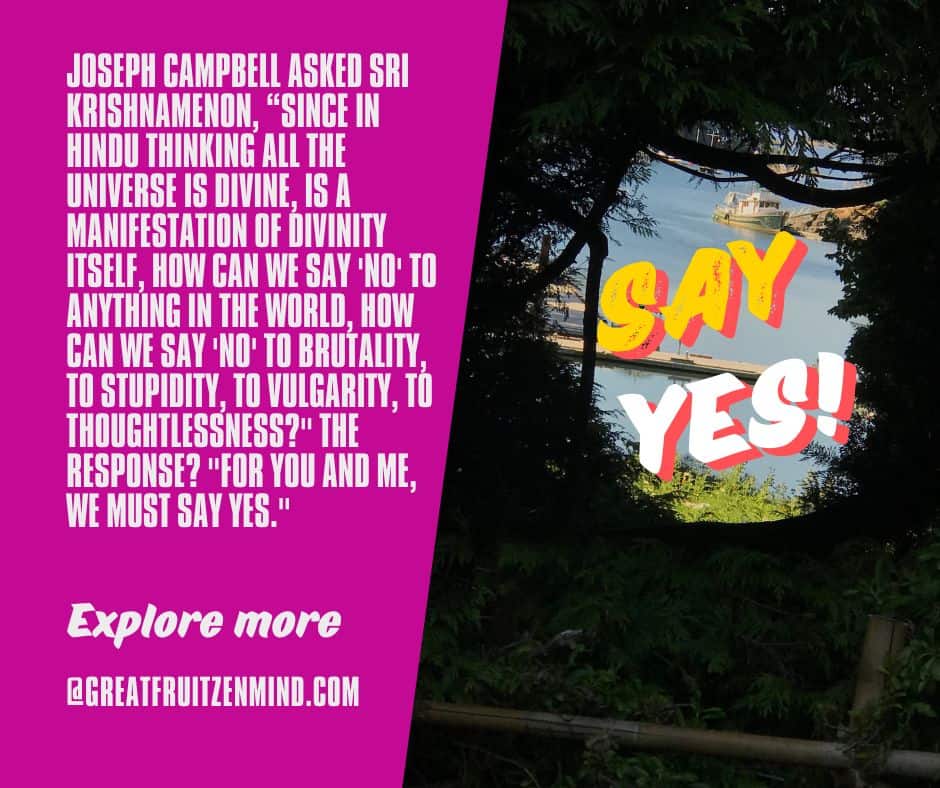Read time 3 minutes. ‘Yes and’ Zen is a stand alone article in our series regarding Acceptance.
Joseph Campbell once asked Sri Krishnamenon, “Since in Hindu thinking all the universe is divine, is a manifestation of divinity itself, how can we say ‘no’ to anything in the world—how can we say ‘no’ to brutality, to stupidity, to vulgarity, to thoughtlessness?”
Krishnamenon’s reply was simple: “For you and me, we must say yes.”
Another story often told is John Lennon’s first encounter with Yoko Ono. At her art exhibition, Lennon noticed a piece: an A-frame ladder leading up to a magnifying glass and a tiny note pinned to the ceiling. The note said, simply: “Yes!”
All the world’s a stage
In improv comedy, beginners are taught the principle of yes and. To respond with yes and is to accept what your partner has offered and add to it. It validates the other person, welcomes the moment, and opens the door to possibilities.
By contrast, a no but brings the scene to a halt. It rejects the offering and demands something else entirely. No is a closure, a wall. Yes is an opening.
And what is life, if not the greatest improvisational stage? Improvisation does not mean abandon preparation, but it does mean balancing method with invention. Life, too, asks for both discipline and spontaneity.
Recent lessons on acceptance showed that acceptance itself is less about forcing ourselves to like everything and more about raising awareness to what is. When we let go of struggle, life slows down. Pressure eases. Ego loosens its grip, and what remains is a wiser, more instinctive creativity.
The yes and of Zen
But Zen always takes us deeper. The practice is not simply about saying yes to every situation. More important than yes is not saying no.
Silence—the stance of nonjudgmental observation—becomes a new kind of approval. Just as Absolute Humility can hold both arrogance and humility without clinging to either, what we are pointing toward here is an Absolute Yes—a yes so complete it dissolves the very distance between yes and no.
Imagine if, at the top of Ono’s ladder, the note had been left blank. What then? Improv actors rarely say yes and outright; it is implied in the way they respond. Similarly, saying nothing is not absence but infinite openness. If saying yes opens the door to some possibilities, saying nothing opens the door to infinite possibilities. Among them may even be a quiet, honest, “Not for me, thanks.”
The bottom line of acceptance, and the way of Zen: Don’t close. Don’t say no.
Explore more:
A quick online search of yes and reveals that I am not the first person to make the connection between this technique and everyday life. This article on the website Well+Good lays out five interesting benefits to incorporating this technique into other aspects of our life. In particular, I like the idea that, “It helps to say ‘no’ by saying ‘yes’ to something else.”
–
Greatfruit Zen Mind is committed to remaining independent and ad-free. Thank you for your support. Join The Undercurrent. Stay connected. See you next time.
🌀 From the GZM Archives – Polished, Preserved, Still Relevant.


Leave a Reply